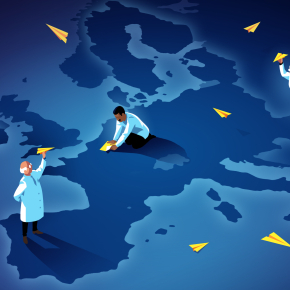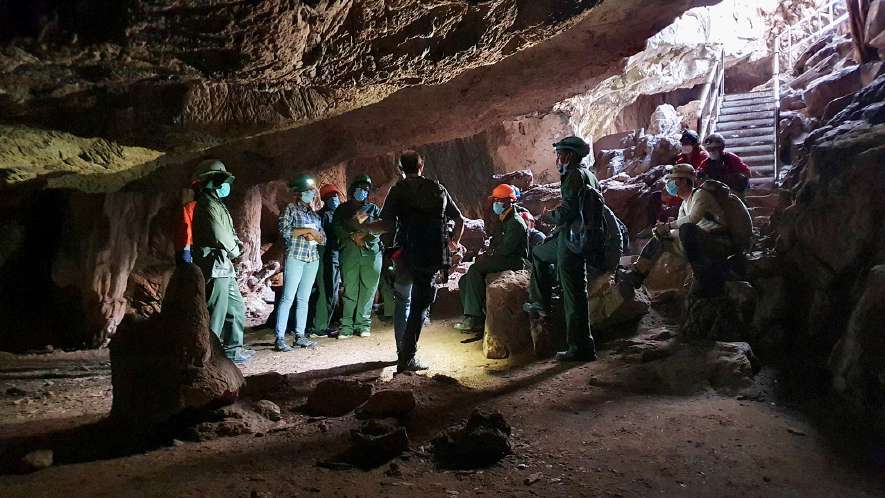Research – which way forward for Europe
Discover the CNRS series on the challenges of European research.

Horizon Europe is the world's most open research programme in the world with its twenty associated countries. This strategic tool for global science has been fully embraced by the CNRS.
Discover the CNRS series on the challenges of European research.
On January 1st 2024, exactly four years after the United Kingdom left the European Union (EU) and its research programmes, British researchers once again became able to take part in the Horizon Europe programme on an equal footing with their counterparts in EU Member States, although a number of projects linked to so-called 'critical' technologies like quantum technology were excluded. As soon as Brexit was announced and even before the departure of the UK had taken full effect, the British and European research communities - including the CNRS of course - were already working to persuade the authorities on both sides of the Channel to develop an association agreement for this major EU framework programme. By mid-2025, twenty countries outside the EU had been allowed to take part in the programme, or part of it, under exactly this kind of association agreement.
"Clearly, although the United Kingdom tended to have a problematic view of the European Union, they quickly realised that European research worked really well. The Framework Programme for Research and Technological Development, (FP) enables Europe to remain a world leader," explains Patrick Nédellec, the French Embassy in London's science and technology advisor. In 2024, the UK was far the participation levels its scientists had enjoyed before leaving the programme. Indeed European project engineers in the UK were made redundant as the last European projects ended which of course led to a loss of crucial know-how. "However, after a mixed first year, the results for 2025 are clearly very much improving," continues Patrick Nédellec, with the first projects that have been won making it possible to take on new project engineers.
A strategic link between the CNRS and Imperial College
"The relationship between France and the United Kingdom is now in an extremely positive phase. The fact that the UK left the EU has actually bolstered the bilateral relationship between the two countries and the British research community is very keen on developing partnerships with France," adds Patrick Nédellec. A good example of bilateral relations of this kind is the International Research Centre (IRC) involving the CNRS and Imperial College launched in April 2022. Alain Mermet, director of the organisation's European and International Affairs Department (DEI) explains that "the CNRS's directors decided to create a special partnership to maintain links with British colleagues because the United Kingdom is a key country for the CNRS. It's the CNRS's third largest co-publishing country after the United States and Germany, and its leading partner among Horizon Europe's associated countries".

The bilateral partnerships developed during this period with the United Kingdom have enabled a significant level of collaboration to be maintained but the fact remains that "the advantage of Horizon Europe collaborative projects is that they bring together different actors, provide access to more ambitious funding and promote excellence synergies," adds Mr Mermet. While the ANR in France and its British counterpart UKRI have funded bilateral calls, "the level of funding is nowhere near what Horizon Europe can provide."
Raising awareness among our international networks
The CNRS runs around 90 international laboratories (IRLs) in 39 partner countries and nearly 400 projects or networks (international research projects, international research networks) with 80 countries. "A significant proportion of these projects represent opportunities for Horizon Europe. We're raising the awareness of all these international collaboration projects about more ambitious collaboration opportunities driven by more substantial funding from Horizon Europe," explains Alain Mermet. For example, the CNRS's AMORCE call for projects provides support for those setting up coordinated European research projects and aims to help researchers wishing to launch collaborative European projects by funding mobility so they can travel to meet their partners in forming a consortium. "Particular attention is paid to collaborative projects that involve international partners, whether they're associated with Horizon Europe or not," he adds.
Africa is on the European agenda
The CNRS's Multi-year Cooperation Plan with Africa is another tool that supports partnerships of this kind, aiming as it does to bolster research relations with the African continent. Currently, only Tunisia is associated with Horizon Europe although Egypt has finalised its negotiations and Morocco is currently in discussions. For other African countries, participation is possible for certain projects in the framework of the EU's overall strategy with Africa. This has driven the continent's participation to "increase by 40% since the start of Horizon Europe compared with Horizon 2020," reveals Laurent Bochereau, EU scientific advisor to the African Union.
"Horizon Europe is the world's most open programme - it's a great tool for us!" says Alain Mermet. At a time when the global order is being reconfigured, some of the CNRS's partners are taking a close look at the opportunities on offer for countries that join Horizon Europe. This is the case of Australia, which Mr Mermet says "is increasingly turning to the EU. The current situation in the United States have led countries to look to the EU which could be an opportunity for Europe to enhance its attractiveness and consolidate its position on the world scientific stage."

Canada is shifting towards Europe
This analysis is confirmed by Daniel Jutras, rector of the University of Montreal and the recently appointed President of U15, an association made up of fifteen major Canadian research universities. Canada's association agreement came into force on January 1st 2024 and Mr Justras explains that his country "wishes to reduce the weighting of its partnerships with the United States and is turning to Europe as a privileged partner. This message is being relayed by all of Canada's European embassies which are stepping up their efforts to forge links with European partners." Universities are not slow in setting up new partnerships either, as the April 2024 inauguration of the new IRC 'Innovation for a Sustainable Planet'between the CNRS and the University of Sherbrooke in Quebec clearly shows. The U15 president of U15 also cites the numerous visits to Europe by Canadian university rectors "who came to showcase the strengths of their institutions".

In 2022, the University of Montreal opened a representative office in Paris as "the starting point for our strategy. I went with my Vice-Rector for International Affairs to meet European partners and develop closer contacts with diplomatic representatives in Brussels. We want to strengthen our visibility in Europe."
Training and convincing
As well as 'external' work of this kind, this new push to move closer to Europe means universities need to do a lot of internal work to raise awareness among scientists. Daniel Jutras explains that "we've trained our support teams to add this tool to our range of research opportunities. It's not always easy because our researchers are more used to developing projects in Quebec and working with Canadian programmes, so we need to get them to think differently". The University of Montreal has a team of three dedicated staff members working on international affairs with one specifically focusing on Horizon Europe projects and running awareness-raising workshops. The university has also created a small seed fund to facilitate the preparation of projects of this kind. The rector also thinks it necessary to reinforce "networking with industry" to support the drive to access European projects. "The new Canadian government is very vocal about knowledge transfer to the economy and European governments are also very keen to see results. Both in Canada and in Europe there are funding structures that still prioritise basic research," he adds.
Alain Mermet explains that "European programmes have a reputation for being administratively cumbersome, although we should acknowledge the European Commission's efforts on this, such as lump sum financing, but unfortunately this reputation has spread beyond our borders". He reports "numerous questions" on this subject from partners in countries associated with Horizon Europe like Canada, South Korea or New Zealand) or in discussions about association with the European Commission for association like Japan and Australia. "Thanks to the CNRS's Europe strategy, we now have a large number of European project engineers who are ready and motivated to provide support for researchers and their international partners in setting up European projects," he adds as a testimony to the CNRS's commitment to supporting its partners in the European adventure.